2019-2020学年江苏省扬州中学高二下学期期中考试 英语 Word版 听力
江苏省扬州中学2019-2020学年度第二学期高三测试英语试卷(含答案)2020.4

江苏省扬州中学2019-2020学年度第二学期高三测试试卷英语2020.04第一节(共5小题;每小题1分,满分5分)听下面5段对话。
每段对话后有一个小题,从题中所给的A、B、C三个选项中选出最佳选项,并标在试卷的相应位置。
听完每段对话后,你都有10秒钟的时间来回答有关小题和阅读下一小题。
每段对话仅读一遍。
1. What does the man think of David's car?A. It’s too expensive.B. It's really cheap.C. It's rather old.2. When did the woman go shopping?A. Before sleeping.B. After taking a walk.C. After dinner.3. What can we learn from the dialogue?A. The man's car hit a truck.B. The man is badly injured.C. The car can still work well.4. How does Peter feel about the results of the test?A. Worried.B. Disappointed.C. Satisfied.5. Where are the two speakers most probably?A. In a taxi.B. On a bus.C. On a plane.第二节(共15小题;每小题1分,满分15分)听下面5段对话或独白。
每段对话或独白后有几个小题,从题中所给的A、B、C三个选项中选出最佳选项,并标在试卷的相应位置。
听每段对话或独白前,你将有时间阅读各个小题,每小题5秒钟;听完后,各小题给出5秒钟的作答时间。
每段对话或独白读两遍。
听第6段材料,回答第6、7题。
江苏省扬州中学2019-2020学年高二下学期4月月考试题+英语+Word版答案

英语学习讲义江苏省扬州中学2019-2020学年阶段测试高二答案第一部分听力(每小题1.5分,满分30分)1-5 CCABB6-10 CBCBA11-15 CCBCC 16-20 CBACC 第二部分阅读理解(每小题2分,满分40分)第一节A21-23 BDB B 24-27 DDAB C 28-31ABDC D 32-35 ADCB第二节36-40 EAFDG第三部分语言运用第一节完形填空(共20小题;每小题1.5分,满分30分)41-45 CAACB 46-50 DDABA 51-55 DDBCB 56-60CDCBA第二节词汇辨析(共5小题;每小题1分,满分5分)61-65 DCBDB第三节动词填空(共10小题;每小题1分,满分10分)66. to have been 67. had been told 68. remaining 69. had been lying70. are being cut 71. having 72. hang 73. looking 74. proved75.have decided第四节(共10小题;每小题1分,满分10分)76.dishes 77. who/that 78. it 79. visiting 80.hadn’t cooked 81. have become 82.without 83.affordable 84. higher 85.for第四部分写作(概要写作,满分25分)Contrary to people’s vision of a better city life, self-driving cars are on the road to nowhere(要点1). First, like auto-machines in other fields, driverless cars are literally not completely independent of humans(要点2). Besides, demanding complicated technology, such cars can be a threat if a possible error occurs(要点3). Trust issues for human-less cars, however, remains a major concern(要点4). That’s why automakers are seeking ways to allow drivers more control on their vehicles(要点5).只要坚持梦想终会实现 1。
江苏省扬州中学2019-2020学年高二下学期4月月考试题+英语+Word版
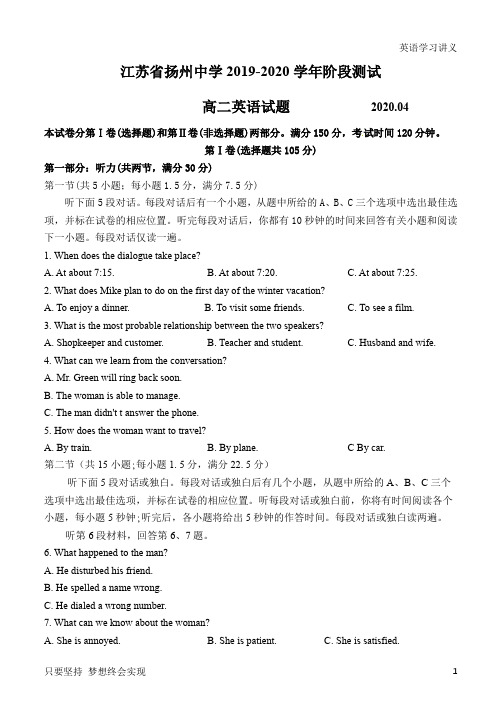
江苏省扬州中学2019-2020学年阶段测试高二英语试题2020.04本试卷分第Ⅰ卷(选择题)和第Ⅱ卷(非选择题)两部分。
满分150分,考试时间120分钟。
第Ⅰ卷(选择题共105分)第一部分:听力(共两节,满分30分)第一节(共5小题;每小题1.5分,满分7.5分)听下面5段对话。
每段对话后有一个小题,从题中所给的A、B、C三个选项中选出最佳选项,并标在试卷的相应位置。
听完每段对话后,你都有10秒钟的时间来回答有关小题和阅读下一小题。
每段对话仅读一遍。
1. When does the dialogue take place?A. At about 7:15.B. At about 7:20.C. At about 7:25.2. What does Mike plan to do on the first day of the winter vacation?A. To enjoy a dinner.B. To visit some friends.C. To see a film.3. What is the most probable relationship between the two speakers?A. Shopkeeper and customer.B. Teacher and student.C. Husband and wife.4. What can we learn from the conversation?A. Mr. Green will ring back soon.B. The woman is able to manage.C. The man didn't t answer the phone.5. How does the woman want to travel?A. By train.B. By plane. C By car.第二节(共15小题;每小题1. 5分,满分22. 5分)听下面5段对话或独白。
江苏省扬州中学2019-2020学年高二下学期期中考试英语期中考试试题2020.5
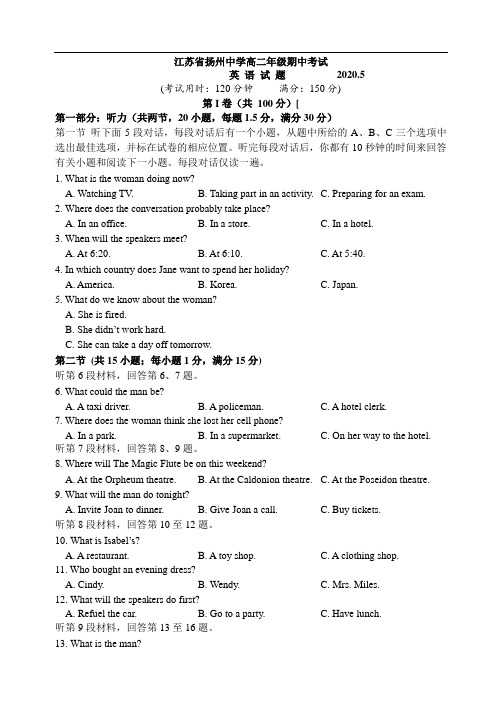
江苏省扬州中学高二年级期中考试英语试题2020.5(考试用时:120分钟满分:150分)第I卷(共100分)[第一部分:听力(共两节,20小题,每题1.5分,满分30分)第一节听下面5段对话,每段对话后有一个小题,从题中所给的A、B、C三个选项中选出最佳选项,并标在试卷的相应位置。
听完每段对话后,你都有10秒钟的时间来回答有关小题和阅读下一小题。
每段对话仅读一遍。
1. What is the woman doing now?A. Watching TV.B. Taking part in an activity.C. Preparing for an exam.2. Where does the conversation probably take place?A. In an office.B. In a store.C. In a hotel.3. When will the speakers meet?A. At 6:20.B. At 6:10.C. At 5:40.4. In which country does Jane want to spend her holiday?A. America.B. Korea.C. Japan.5. What do we know about the woman?A. She is fired.B. She didn’t work hard.C. She can take a day off tomorrow.第二节(共15小题;每小题1分,满分15分)听第6段材料,回答第6、7题。
6. What could the man be?A. A taxi driver.B. A policeman.C. A hotel clerk.7. Where does the woman think she lost her cell phone?A. In a park.B. In a supermarket.C. On her way to the hotel.听第7段材料,回答第8、9题。
江苏省扬州中学2019-2020学年高二下学期期中考试英语期中考试答案
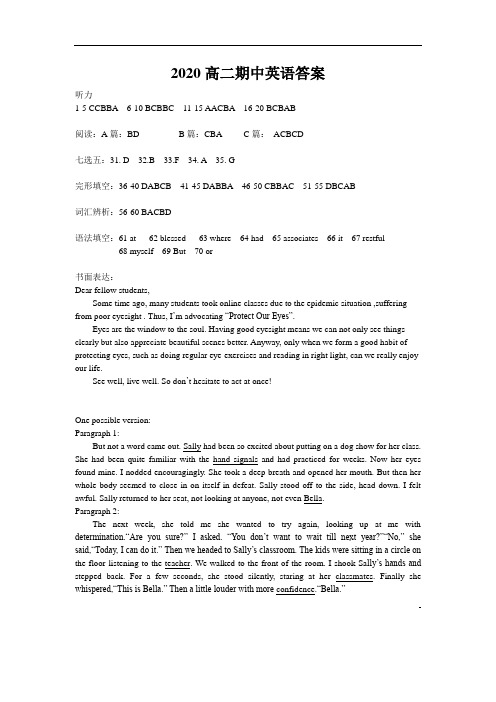
2020高二期中英语答案听力1-5 CCBBA 6-10 BCBBC 11-15 AACBA 16-20 BCBAB阅读:A篇:BD B篇:CBA C篇:ACBCD七选五:31. D 32.B 33.F 34. A 35. G完形填空:36-40 DABCB 41-45 DABBA 46-50 CBBAC 51-55 DBCAB词汇辨析:56-60 BACBD语法填空:61 at 62 blessed 63 where 64 had 65 associates 66 it 67 restful68 myself 69 But 70 or书面表达:Dear fellow students,Some time ago, many students took online classes due to the epidemic situation ,suffering from poor eyesight . Thus, I’m advocating “Protect Our Eyes”.Eyes are the window to the soul. Having good eyesight means we can not only see things clearly but also appreciate beautiful scenes better. Anyway, only when we form a good habit of protecting eyes, such as doing regular eye-exercises and reading in right light, can we really enjoy our life.See well, live well. So don’t hesitate to act at once!One possible version:Paragraph 1:But not a word came out. Sally had been so excited about putting on a dog show for her class. She had been quite familiar with the hand signals and had practiced for weeks. Now her eyes found mine. I nodded encouragingly. She took a deep breath and opened her mouth. But then her whole body seemed to close in on itself in defeat. Sally stood off to the side, head down. I felt awful. Sally returned to her seat, not looking at anyone, not even Bella.Paragraph 2:The next week, she told me she wanted to try again, looking up at me with determination.“Are you sure?” I asked. “You don’t want to wait till next year?”“No,” she said,“Today, I can do it.” Then we headed to Sally’s classroom. The kids were sitting in a circle on the floor listening to the teacher. We walked to the front of the room. I shook Sa lly’s hands and stepped back. For a few seconds, she stood silently, staring at her classmates. Finally she whispered,“This is Bella.” Then a little louder with more confidence.“Bella.”听力原文:Text 1M: Mary, why won’t you watch the 56th Annual Grammy Awards on TV?W: Oh, I’m studying for a Spanish test.Test 2M: Can I help you, madam?W: Yes, thank you. I seem to have lost my room key.M: Take it easy. You can go to the front desk to get the spare one.Text 3M: How about meeting at twenty to six?W: Well, could we make it twenty past six?M: That’s a bit late for me. I have to meet my son. I could manage ten past six.W: It’s settled. See you then.Text 4M: Jane, who are you going on holiday with this summer?W: My aunt. She is coming home from America.M: Where are you going?W: I’ve already booked two first class tickets to Korea. But my aunt wanted to go to Japan.Text 5M: Jessica, you needn’t come to work tomorrow.W: This news comes as a shock. Would you tell me the reason?M: I know you have been working very hard, but your work does not reach the standard required.Text 6M: Could you recall how you lost your cell phone?W: After visiting a park, I did some shopping in a supermarket. Then I went back to my hotel. Perhaps I left it in the taxi to my hotel. I’m not sure.M: OK. Don’t worry. Can you remember the number of the taxi?W: Yes. It’s likely that the taxi is marked with T-3345.M: We’ll get in touch with the taxi company as soon as possible. If you have other clues, please call us.Text 7W: There’s a new musical at the Orpheum theatre this weekend. Would you like to go?M: I don’t really care for musicals. Are there any Shakes peare plays on?W: There’s just A Midsummer Night’s Dream on at the Poseidon. But, we just saw that last year. M: What’s playing at the Caldonion theatre?W: An Italian opera named The Magic Flute.M: We could go to see that. I do like operas. Maybe we should invite Joan to go with us. I remember once that she said she loves operas.W: That’s a good idea. We haven’t seen her for a while. That would be fun.M: I’ll give her a call tonight after dinner. And you call for tickets. OK?W: Great!Text 8M: Hi, W endy. I’m going to Isabel’s. Are you coming?W: No. The things there are too expensive for me. I can’t afford them.M: Don’t worry. Isabel’s is having a clearance sale, and today is the last day.W: Really? That’s wonderful. Can you wait a second? I need t o change.M: All right, but hurry up.W: Should we ask Cindy to come along? She saw an evening dress made of silk there last month which she liked very much.M: She has already bought that evening dress.W: When?M: Yesterday. She wore that dress last nigh t, and showed off to everybody at Mr. Miles’ party. W: Oh! That isn’t like her.M: Hurry up, will you? We’ll have to go to a gas station first. We’d better be there before lunch. W: All right, all right. I’m ready now. Let’s go.Text 9W: To start with, tell me about your education, please.M: All right. I shall graduate from Columbia University of Foreign Studies next year. I major in international trade.W: Are you single or married?M: I’m still single. I’d rather secure my career before settling down in a family.W: That’s the kind of man we are looking for. Our promotion work needs much travel. So, do you mind many business trips? There will be six to ten times traveling abroad a month.M: Six to ten? Oh, that is indeed…W: OK. So I would say this work is indeed demanding.M: Er… I think it will be a challenge for me, but I am glad to take it.W: It has been pleasant talking with you. We’ll notify you of our final decision within one week. M: Thank you, Mrs. Hudson, for your interview with me. I hope to see you again.W: Goodbye.Text 10M: Hi, everyone! Welcome to my blog. Here is the message I promised you. Last weekend we were taken around London in a bus. It was fantastic. I saw Big Ben and the Houses of Parliament, the lions in Trafalgar Square, Tower Bridge and the Tower of London. I liked the Tower of London best because it is a thousand years old. They say there are lots of ghosts walking around but I didn’t see any! We also went to see all the famous people made of wax(蜡)at Madame Tussauds(杜莎夫人蜡像馆).That was good fun. Jean Louis took a photograph of me standing next to Queen Elizabeth the Second.Tomorrow we’re going to Stratford on Avon where Shakespeare was born. And we’re going to see one of his plays. It’s called Hamlet. There are three theat ers in Stratford and we are going to see it in the Royal Shakespeare Theater. Our teacher told us the houses in Stratford are about five hundred years old and the countryside is beautiful, so I’ll take lots of photos to show you.。
江苏省2019-2020学年高二第二学期期中英语试题精选汇编:应用文写作含答案
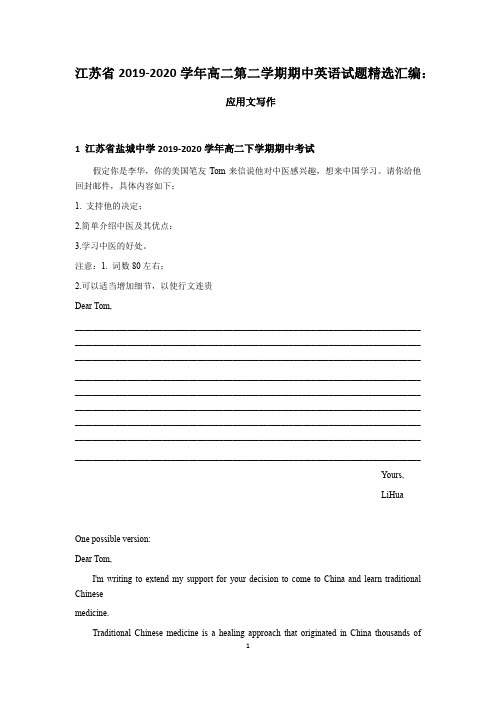
江苏省2019-2020学年高二第二学期期中英语试题精选汇编:应用文写作1 江苏省盐城中学2019-2020学年高二下学期期中考试假定你是李华,你的美国笔友Tom来信说他对中医感兴趣,想来中国学习。
请你给他回封邮件,具体内容如下:1. 支持他的决定;2.简单介绍中医及其优点:3.学习中医的好处。
注意:1. 词数80左右;2.可以适当增加细节,以使行文连贵Dear Tom,_______________________________________________________________________________________________________________________________________________________________________________________________________________________________________________________________________________________________________________________________________________________________________________________________________________________________________________________________________________________________________________________________________________________________________________________________________________________________________________________________________________________________________________________________________Yours,LiHuaOne possible version:Dear Tom,I'm writing to extend my support for your decision to come to China and learn traditional Chinesemedicine.Traditional Chinese medicine is a healing approach that originated in China thousands ofyears ago. The practitioners use various mind and body practices such as acupuncture and t'ai chi as well as herbal products to address health problems.By learning it,you will know more about how to keep yourself and others physically and mentally healthy.I hope you can have a good command of it.(84 words)Yours,Li Hua2 应用文写作假定你是李华,你想参加学校举办的英语诗歌朗诵比赛,请你给外教Mr.Smith发一封邮件,请他帮你选一首诗,并给予指导。
2019-2020学年江苏省扬州中学2018级高二下学期期中考试英语试卷及答案
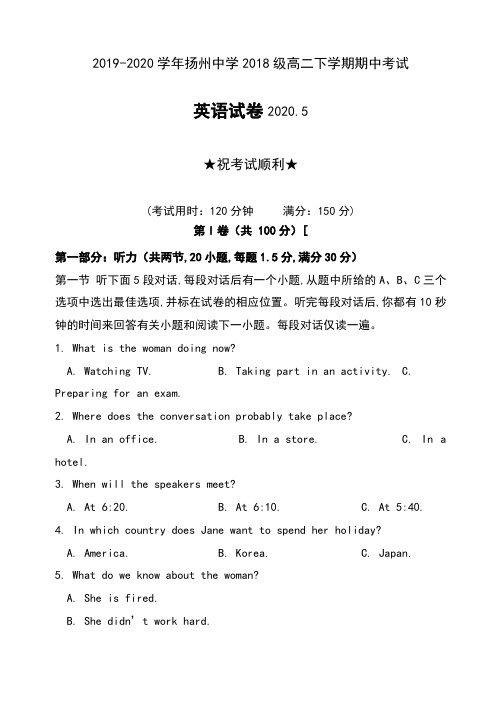
2019-2020学年扬州中学2018级高二下学期期中考试英语试卷2020.5★祝考试顺利★(考试用时:120分钟满分:150分)第I卷(共 100分)[第一部分:听力(共两节,20小题,每题1.5分,满分30分)第一节听下面5段对话,每段对话后有一个小题,从题中所给的A、B、C三个选项中选出最佳选项,并标在试卷的相应位置。
听完每段对话后,你都有10秒钟的时间来回答有关小题和阅读下一小题。
每段对话仅读一遍。
1. What is the woman doing now?A. Watching TV.B. Taking part in an activity.C. Preparing for an exam.2. Where does the conversation probably take place?A. In an office.B. In a store.C. In a hotel.3. When will the speakers meet?A. At 6:20.B. At 6:10.C. At 5:40.4. In which country does Jane want to spend her holiday?A. America.B. Korea.C. Japan.5. What do we know about the woman?A. She is fired.B. She didn’t work hard.C. She can take a day off tomorrow.第二节 (共15小题;每小题1分,满分15分)听第6段材料,回答第6、7题。
6. What could the man be?A. A taxi driver.B. A policeman.C. A hotel clerk.7. Where does the woman think she lost her cell phone?A. In a park.B. In a supermarket.C. On her way to the hotel.听第7段材料,回答第8、9题。
江苏省扬州中学2019-2020学年高二英语4月月考试题
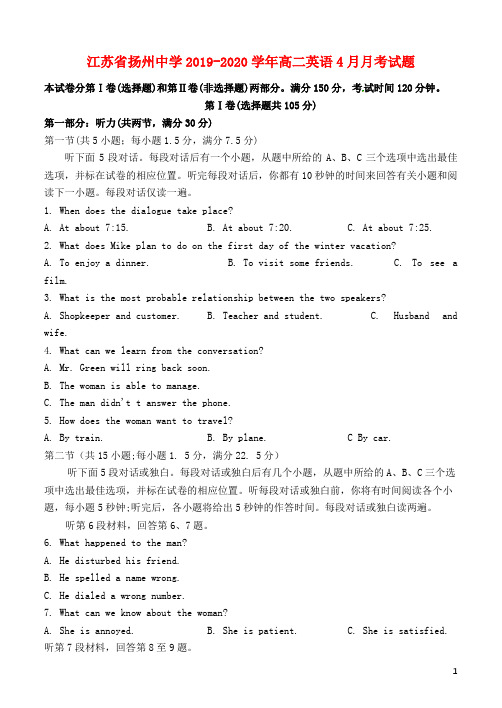
江苏省扬州中学2019-2020学年高二英语4月月考试题本试卷分第Ⅰ卷(选择题)和第Ⅱ卷(非选择题)两部分。
满分150分,考试时间120分钟。
第Ⅰ卷(选择题共105分)第一部分:听力(共两节,满分30分)第一节(共5小题;每小题1.5分,满分7.5分)听下面5段对话。
每段对话后有一个小题,从题中所给的A、B、C三个选项中选出最佳选项,并标在试卷的相应位置。
听完每段对话后,你都有10秒钟的时间来回答有关小题和阅读下一小题。
每段对话仅读一遍。
1. When does the dialogue take place?A. At about 7:15.B. At about 7:20.C. At about 7:25.2. What does Mike plan to do on the first day of the winter vacation?A. To enjoy a dinner.B. To visit some friends.C. To see a film.3. What is the most probable relationship between the two speakers?A. Shopkeeper and customer.B. Teacher and student.C. Husband and wife.4. What can we learn from the conversation?A. Mr. Green will ring back soon.B. The woman is able to manage.C. The man didn't t answer the phone.5. How does the woman want to travel?A. By train.B. By plane. C By car.第二节(共15小题;每小题1. 5分,满分22. 5分)听下面5段对话或独白。
- 1、下载文档前请自行甄别文档内容的完整性,平台不提供额外的编辑、内容补充、找答案等附加服务。
- 2、"仅部分预览"的文档,不可在线预览部分如存在完整性等问题,可反馈申请退款(可完整预览的文档不适用该条件!)。
- 3、如文档侵犯您的权益,请联系客服反馈,我们会尽快为您处理(人工客服工作时间:9:00-18:30)。
江苏省扬州中学高二年级期中考试英语试题2020.5(考试用时:120分钟满分:150分)第I卷(共100分)[第一部分:听力(共两节,20小题,每题1.5分,满分30分)第一节听下面5段对话,每段对话后有一个小题,从题中所给的A、B、C三个选项中选出最佳选项,并标在试卷的相应位置。
听完每段对话后,你都有10秒钟的时间来回答有关小题和阅读下一小题。
每段对话仅读一遍。
1. What is the woman doing now?A. Watching TV.B. Taking part in an activity.C. Preparing for an exam.2. Where does the conversation probably take place?A. In an office.B. In a store.C. In a hotel.3. When will the speakers meet?A. At 6:20.B. At 6:10.C. At 5:40.4. In which country does Jane want to spend her holiday?A. America.B. Korea.C. Japan.5. What do we know about the woman?A. She is fired.B. She didn’t work hard.C. She can take a day off tomorrow.第二节(共15小题;每小题1分,满分15分)听第6段材料,回答第6、7题。
6. What could the man be?A. A taxi driver.B. A policeman.C. A hotel clerk.7. Where does the woman think she lost her cell phone?A. In a park.B. In a supermarket.C. On her way to the hotel.听第7段材料,回答第8、9题。
8. Where will The Magic Flute be on this weekend?A. At the Orpheum theatre.B. At the Caldonion theatre.C. At the Poseidon theatre.9. What will the man do tonight?A. Invite Joan to dinner.B. Give Joan a call.C. Buy tickets.听第8段材料,回答第10至12题。
10. What is Isabel’s?A. A restaurant.B. A toy shop.C. A clothing shop.11. Who bought an evening dress?A. Cindy.B. Wendy.C. Mrs. Miles.12. What will the speakers do first?A. Refuel the car.B. Go to a party.C. Have lunch.听第9段材料,回答第13至16题。
13. What is the man?A. A salesman.B. A teacher.C. A student.14. What is the second point being talked about?A. The man’s education.B. The man’s marriage.C. The man’s demand.15. How does the man find the job?A. Challenging.B. Relaxing.C. Interesting.16. What will the man do?A. Have another interview.B. Wait for the reply.C. Think about the business trips. 听第10段材料,回答第17至20题。
17. What did the speaker like best?A. Big Ben.B. Tower Bridge.C. The Tower of London.18. Where did the speaker take a photo?A. At Trafalgar Square.B. At Madame Tussauds.C. At the Royal Shakespeare Theater.19. How old are the houses in Stratford?A. About 500 years old.B. About 1,000 years old.C. About 2,000 years old.20. Why does the speaker give the message?A. To introduce his blog.B. To tell about his trip in England.C. To recommend people to visit London.第二部分:阅读理解(共两节,满分35分)第一节(共10小题,每小题2.5分, 满分25分)阅读下面3篇短文,从每题所给的A、B、C、D四个选项中,选出最佳选项,并在答题卡上将该项涂黑。
ABruny Island and the D' Entrecasteaux Channel*Duration: 4 days, 3 nights*From AU$1, 200.00 per personSail aboard Yukon on “the channel”, a favorite cruising ground for the Tasmanian sailor. This partially sheltered water way between the Tasmanian mainland and Bruny Island has a lot of anchorages (锚地) and beaches. An ideal passage for a short break, this 3-night voyage is a good introduction to coastal cruising aboard Yukon.This is an excellent opportunity to take a comfortable low-impact holiday and feel the amazing experience of a wooden ship under sail at sea.Indicative Itinerary (旅行路线)*Waterloo Bay*Egg and Bacon Bay*Mickeys Bay (Bruny Island)*Partridge Island*The Quarries*Great Taylors BayPossible Wildlife Encounters (相遇)Seals, dolphins, whales and birdlife.[]All destinations are considered with regard to weather and an individual’s capacity. The prime objective of the voyages is to enjoy “the channel” and Bruny Island’s coastal surrounds, whilst taking advantage of Yukon’s roomy comfort. A series of short guided/unguided walks will be a part of the daily program.Please contact us for availability.Includes:All meals from Lunch on day 1 to Lunch on day 4All accommodation on board the YukonThe return trip to FranklinPhone:0447 972342or 0498 578535Address:Franklin Marina3333 Huon Highway FranklinThe Yukon is at the jetty (码头) near the Franklin Wooden Boat Centre.21. What will the tourists probably do during the travel?A. Learn to sail.B. Enjoy Yukon’s large space.C. Go downtown Tasmania.D. Watch whale hunting.22. What can we learn about the cost of the trip?A. It is fairly high.B. It offers only a one-way ticket.C. It includes daily three meals.D. It is flexible.BSummer brings flowers and dirt and barbeque smoke. In the most wintery places, there isn’t much outside on cold days except snow, strong wind and cars warming up. Pine needles, wood smoke and snow---these are the smells of winter, and for people who live with different seasons, wintry weather brings its own set of olfactory(嗅觉的) experiences. But why does the cold of winter smell different from the heat of summer?One reason is that odor (气味) molecules move much more slowly as the air temperature drops, said Pamela Dalton, an olfactory scientist at the Monell Chemical Senses Center in Philadelphia. That means that there are simply fewer smells to smell on a cold, crisp day than there are on a hot and humid one. It’s the same reason w hy hot soup smells more than cold soup does and why the garbage truck leaves behind the strongest smells on steamy summer days.What’s more, our noses don’t work quite well when the surrounding air is cold, Dalton said. In experiments that require biopsies(活组织检查) of olfactory receptors that lie deep inside thenose, researchers at Monell have discovered that the receptors “bury themselves a little more deeply in the nose in winter,” she said, “possibly as a protective response against cold, dry air.”There is a strong psychological factor in our sense of smell, Hirsch added, and what we expect to smell has a big influence on what we actually smell. In The Invalid’s Story by Mark Twain, for example, a man is stuck on a train next to what he thinks is a rotting dead body but is actually a box of cheese that smells extremely unpleasant. So strongly affected by the smell, he spends too long looking for fresh air on the freezing platform and develops a fever that ends up killing him. “What you think of a smell hav e powerful effects on you whether you like it and whatever you think it to be,” Hirsch said. “So, if you go outside in winter and you are used to smelling snow or nuts in the fire or whatever you happen to smell outside, that’s what you will interpret smel ls to be.”To cope with lack of smells in winter, many people try to burn more candles with pleasant smell, cook more sweet stews(炖菜) and bake more cookies, which creates a greater contrast between the indoor and outdoor environments. “You’re probably fond of indoor smells in the winter,” Dalton said. “Homes are closed up, and windows are closed. We concentrate on the smells of cooking and living.”23. According to the second paragraph, Pamela Dalton will probably agree that _________.A. air temperature affects sm ells’ spreading direction greatlyB. hot soup is more popular with people in winter than cold soupC. there are not many smells available to be smelled in winterD. a garbage truck is easier to break down in cold winter24. The author used the story written by Mark Twain to show that _________.A. one can easily feel terrible smell in a small spaceB. one’s mind and thoughts can affect the sense of smellC. no one can survive when there is lack of fresh airD. one’s opinion on smell i s quite different from others25. Which of the following is NOT the measure people take to deal with lack of smells in winter?A. Closing doors and windowsB. Cooking stewsC. Burning candlesD. Baking cookiesCHe looked like a pirate.With his handkerchief tied in a knot behind his little nine-year-old head, he looked like a pirate, a sad pirate. The first time little David came to our camp, he was hairless and worn out from medical treatments. He was also very angry.Paul Newman's camp counselors (指导老师) were hoping to fill David's days with fun and laughter. But David stayed inside himself, wanting to be alone, or in a corner of the cabin. At this camp for children with life-threatening illnesses, we had seen some pretty tough children worn out by cancer recover full of energy despite their illness. But we saw little progress in David nomatter what we tried with him. Five days into the eight-day session saw a quiet, sad little pirate.Then something happened on that fifth night. Something at camp that we would call "huge". It was cabin night. That's the time when campers and counselors spend time together in each individual cabin instead of an all-camp activity. Campers love cabin nights because there's always a bedtime snack. On the cabin table that night were bags of potato chips.David slowly walked over to the table, leaving his comer to join the rest of us. He took one of the bags of the potato chips and started smashing(弄碎) it with his little fists, as all the other campers looked on in disbelief, I wondered what the cabin counselor would do.The college-age volunteer counselor positioned a bag of chips on die table in front of himself, and he, too, started smashing it with his fist. The campers went crazy as everyone ran to the table to get in on the fun of smashing potato chips with their fists.Somehow everyone knew, everyone sensed, that anger within him was now being released.For the last couple days of the session, David was a different kid. He was a littlenine-year-old boy again, trying to fill the hours of each remaining day at camp with as much fun as could be possible.Several days after the session, David came back again. This time, there wasn't anything he wouldn't try to fit in to his day. He sure was having a great time at camp. David asked me if I needed an altar(祭坛)boy when I celebrated Mass in the woods. Sure enough, he was my altar boy. I remembered how carefully he listened to me when I talked about death. 1 said it's only a doorway. You walk through the door and there's the Lord God and behind God a whole line of people waiting to hug you.After Mass, he said to me, "Hey Fatha, a door, huh?"A couple more days of fun passed and tonight was the talent show. The tradition is that campers and counselors dress up in costumes, and everyone gets a standing applause for singing and dancing or simply just acting like fools on stage.The show had begun: lights, camera, action.Unfortunately, the only action taking place in our row of seats was little David making his way from counselor to counselor to say an early good-bye to camp. He had become quite ill and had to go to the hospital because of this new crisis.When this little nine-year-old pirate stood in front of me, he gave me a hug and a big wet kiss on my cheek. 1 was crying. He was crying. A whole row of counselors was in tears. After the hug and kiss, he put his hands on my shoulders, and tears still in his eyes, said: "See you on the other side of the door, Fatha."26. The camp counselors failed to fill David's beginning days with fun and laughter, mainly because David_____.A. remained in a bad moodB. behaved like a pirateC. was left alone at the campD. was teased by other campers27. Seeing David smashing the potato chips, the counselor did the same thing in response because he _____.A. would like David to eat more of themB. hoped all the other campers would joinC. found it possible to help David release angerD. wanted to show that he was as angry as David28. What can we learn from this article?A. The camp was intended for those talented in singing and dancing.B. The purpose of the camp was to give diseased children caring love.C. The camp was popular among the children who enjoyed their vacation here.D. Medical treatment could be provided to diseased children at the camp.29. Which of the following does NOT show the change in David?A. David came back to the camp for a second session after the first ended.B. David made his way from counselor to counselor to say an early good-bye to camp.C. David had become quite ill and had to go to the hospital because of this new crisis.D. David stood in front of me and gave me a hug and a big wet kiss on my cheek.30. What do you think the theme of the story is?A. Children with deadly diseases are usually difficult to get along with.B. People should have patience with children with life-threatening illnesses.C. People should tell children with life-threatening illnesses to care nothing about death.D. Love and proper guidance can help people look at something negative in a positive way. 第二节(共5个小题;每小题 2 分,满分10 分)根据短文内容,从短文后的选项中选出能填入空白处的最佳选项。
